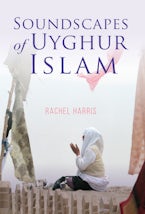- Home
- Framing the Global
- Soundscapes of Uyghur Islam
Preparing your PDF for download...
There was a problem with your download, please contact the server administrator.
Soundscapes of Uyghur Islam
Published by: Indiana University Press
266 Pages, 24 b&w photos, 6 figures
- eBook
- 9780253050199
- Published: November 2020
$34.99
- eBook
- 9780253051370
- Published: November 2020
$34.99
Other Retailers:
China's Xinjiang Uyghur Autonomous Region is experiencing a crisis of securitization and mass incarceration. In Soundscapes of Uyghur Islam, author Rachel Harris examines the religious practice of a group of Uyghur women in a small village now engulfed in this chaos. Despite their remote location, these village women are mobile and connected, and their religious soundscapes flow out across transnational networks. Harris explores the spiritual and political geographies they inhabit, moving outward from the village to trace connections with Mecca, Istanbul, Bishkek, and Beijing. Sound, embodiment, and territoriality illuminate both the patterns of religious change among Uyghurs and the policies of cultural erasure used by the Chinese state to reassert its control over the land the Uyghurs occupy. By drawing on contemporary approaches to the circulation of popular music, Harris considers how various forms of Islam that arrive via travel and the internet come into dialogue with local embodied practices. Synthesized together, these practicies create new forms that facilitate powerful, affective experiences of faith.
1. Sound, Place, and Religious Revival
Interlude 1: Rabiya Acha's Story
2. Affective Rituals in a Uyghur Village
3. Text and Performance in the Hikmät of Khoja Ahmad Yasawi
4. Style and Meaning in the Recited Qur'an
Interlude 2: Tutiwalidu (They'll Arrest You)
5. Mobile Islam: Mediation and Circulation
6. Song-and-Dance and the Sonic Territorialization of Xinjiang
7. Erasure and Trauma
References
Rachel Harris is Professor of Ethnomusicology and Director of Research for the School of Arts at SOAS, University of London. She is author of The Making of a Musical Canon in Chinese Central Asia and Singing the Village, and she has coedited several books, including Theory and Practice in the Music of the Islamic World and Ethnographies of Islam in China.
"Soundscapes of Uyghur Islam will be very useful to several broad categories of scholars, particularly ethnomusicologists, scholars of Central Asia, and scholars of Islam. Harris makes important connections to the research in each field, and fills a gap in knowledge with valuable new content and analyses."
~Nathan Light, Uppsala University
"This book does more to explain the relationship between Uyghurs and Islam in the 21st century than any other scholarship to date. By juxtaposing and interweaving ethnographic analyses of secret Sufi rituals, Quranic recitation, horror-film-influenced supernatural rumors, and state-enforced dance, Harris reveals the mutable stratigraphy of Islams under China's colonial rule. An utterly necessary book, and a fascinating, nuanced read that deserves the attention of scholars, policy makers, and general readers alike."
~Rian Thum, author of The Sacred Routes of Uyghur History
"Through her innovative ethnographic approach to religious soundscapes, Harris makes a landmark contribution to the study of ethnomusicology, Islam, and identity."
~Ildikó Bellér-Hann, author of Community Matters in Xinjiang
"Rachel Harris's work on social justice and the power of music in times of trouble models the kind of activist ethnomusicology that has become a beacon in our field and a pre-requisite for the future of our discipline. Over two decades of research, Harris has witnessed the Uyghur soundscape flourish and shrivel in response to the systematic oppression of people, exercised in part through sonic engineering, by the Chinese authorities, alongside the institutional coercion of the faithful, by the forces of globalized, Islamic conservatism. In response to the mounting dangers of extreme political upheavals in the region, Harris shifts from in-situ fieldwork among an ethnic population in Xinjiang province, to work in the Uyghur borderland sites of migration in Kazakhstan and Kyrgyzstan, Central Asia, and finally to the mode of ethnotextual analysis via the internet where social media platforms convey both the construction of individual and collective subjectivities as well as the destructive forces of globalized, radical, Islamism. From Quranic recitation, to Uyghur music and dance, to the use of insidious song as torture for the incarcerated, Harris invokes notions of repetition and layering to intertwine the ways in which sounds are produced and embodied. Her long-standing interest in music and gender is reflected in a woman-centered approach to ethnography that acknowledges her family fieldwork team, prioritizes collaborative relationships with female colleagues and interlocutors, and foregrounds the multiple perpetrators of slow violence to women and women's ways by both religion and the state. Beautifully theorized and fluidly written, Soundscapes of Uyghur Islam is a model for ethnomusicology in the 21st century."
~Anne K. Rasmussen, Professor of Ethnomusicology, Bickers Professor of Middle Eastern Studies, William & Mary
"Rachel Harris's timely ethnography explores the sounded expressions of the Uyghur people—particularly women—and the impact of two external factors: the flow of Islamic revival from the West, and the tightening of Chinese state control from the East. This is essential reading on the trauma suffered by the Uyghur people, and carries important lessons for all of us on the profound significance of sonic and embodied practices."
~Martin Clayton, Professor of Ethnomusicology, University of Durham
http://www.soundislamchina.org/

